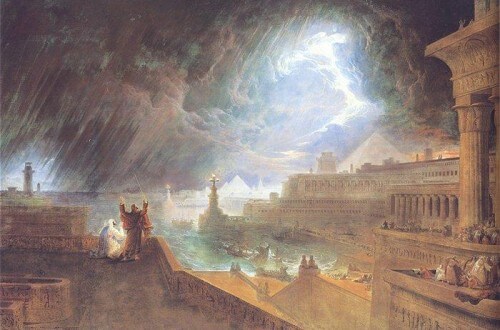Ricochet is the best place on the internet to discuss the issues of the day, either through commenting on posts or writing your own for our active and dynamic community in a fully moderated environment. In addition, the Ricochet Audio Network offers over 50 original podcasts with new episodes released every day.
 A Question About the Book of Exodus
A Question About the Book of Exodus
 I’m listening to the Book of Exodus and I have a question. Okay, so God pops off these plagues. Then Pharaoh is ready to cry uncle a couple of times, but God hardens Pharaoh’s heart. The part I don’t get is: Why?
I’m listening to the Book of Exodus and I have a question. Okay, so God pops off these plagues. Then Pharaoh is ready to cry uncle a couple of times, but God hardens Pharaoh’s heart. The part I don’t get is: Why?
It seems really counterproductive to the overall plan.
Can anybody shed some light on this for me?
Published in General



After reading such great and insightful answers I hesitate to mention this, but we Mormons do use what we call the Joseph Smith Translation which corrects some errors in the KJV of the Bible. In that version, all passages saying that God hardened Pharaoh’s heart have been changed to say that Pharaoh hardened his heart or that it was hardened. The lesson being that God doesn’t make our decisions for us or force us to think, feel or act a certain way.
-E
Changing isn’t the same as translating.
Romans 1 has a similar theme to God hardening Pharoh’s heart. Paul describes God giving people up to their own passions. We are already sinful. We depend on His grace to turn away from sin. If he withdraws that grace we fall deeper into sin.
Depending on Grace is different from God causing someone to sin. God is constantly extending His arms of mercy to us; it is we who turn away. He would never turn someone away without first being provoked. Even Romans 1 shows that. Before He gives them over or gives them up they reject Him.
-E
God has been provoked. It doesn’t start with the hardening of a heart.
We have all sinned against God. It is only through His grace that our sin is restrained at all. That guilt we feel when sinning is part of God’s mercy. It is a warning, just like physical pain. It tells us to turn away from our sin.
Hardening of the heart is the loss of that guilty feeling. We harden our own hearts when we resist that guilty feeling, denying our sins. God hardens hearts as a judgement, allowing sinners to resist His mercy and condemn themselves further.
This conversation led me to think of the phrase “But for the grace of God, there go I”. The attribution to John Bradford at Wikipedia is interesting.
http://en.wikipedia.org/wiki/John_Bradford
It also brings to mind the way Jesus tells people to respond to a tragedy. Tragedy should remind us to repent of our own sins.
Luke 13:2-5
And he answered them, “Do you think that these Galileans were worse sinners than all the other Galileans, because they suffered in this way? No, I tell you; but unless you repent, you will all likewise perish. Or those eighteen on whom the tower in Siloam fell and killed them:do you think that they were worse offenders than all the others who lived in Jerusalem? No, I tell you; but unless you repent, you will all likewise perish.”
It’s not like the events of exodus, but it’s a lesson we should take from many different events.
To SoS and Danny: for the purposes of this conversation, the key (the pshat) is to explain the Torah with no reliance on any external sources. Just what can be found in the text itself.
I commented before I read yours. That does answer the question of free will, though I can’t say fully. It would strike me that emotional responses are still part of free will. But you did bring me closer.
Especially Romans 9:16-18 which directly addresses Pharaoh.
Yeah, people either “explain” that passage or they “explain it away.” I try to be a gentle Calvinist with folks. It’s easy to be over the top on matters like that the will.